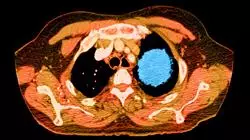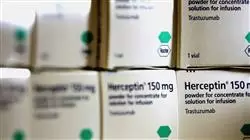University certificate
The world's largest faculty of medicine”
Introduction to the Program
This program will provide you with a sense of confidence in medical practice, which will help you grow personally and professionally”

A fundamental objective of the program is to bring students closer to and disseminate computer knowledge, which is already applied in other fields of knowledge, but has minimal implementation in the medical world, despite the fact that for genomic medicine to become a reality it is necessary to accurately interpret the huge volume of clinical information currently available and associate it with the biological data generated after a bioinformatic analysis. While this is a difficult challenge, it will allow the effects of genetic variation and potential therapies to be explored quickly, inexpensively and with greater precision than is currently possible.
Humans are not naturally equipped to perceive and interpret genomic sequences, to understand all the mechanisms, pathways and interactions that take place within a living cell, nor to make medical decisions with tens or hundreds of variables. To move forward, a system with superhuman analytical capabilities is required to simplify the work environment and show the relationships and proximities between variables. In genomics and biology, it is now recognized that it is better to spend resources on new computational techniques than on pure data collection, something that is possibly the same in medicine and, of course, oncology.
We have millions of data or publications but when they are analyzed by physicians or biologists, the conclusions are totally subjective and relative to the available publications or data, which are prioritized arbitrarily. This generates partial knowledge, which is increasingly distanced from the genetic and biological knowledge available and supported by computation, so a giant step in the implementation of precision medicine is to reduce this distance through the massive analysis of available medical and pharmacological information.
Update your knowledge with the Postgraduate diploma in Clinical Application of Genomic Oncology"
This Postgraduate diploma in Clinical Application of Genomic Oncology contains the most complete and up-to-date scientific program on the market. Its most notable features are:
- Development of case studies presented by experts in Clinical Application of Genomic Oncology
- Its graphic, schematic and eminently practical contents provide scientific and practical information on those disciplines that are essential for professional practice
- New developments on the clinical application of genomic oncology
- It contains practical exercises where the self-assessment process can be carried out to improve learning
- Special emphasis on innovative methodologies in Clinical Application of Genomic Oncology
- All of this will be complemented by theoretical lessons, questions to the expert, debate forums on controversial topics, and individual reflection assignments
- Content that is accessible from any fixed or portable device with an Internet connection
This Postgraduate diploma may be the best investment you can make when selecting a refresher program, for two reasons: in addition to updating your knowledge in Clinical Application of Genomic Oncology, you will obtain a Postgraduate diploma from TECH Global University"
Its teaching staff includes professionals belonging to the field of clinical application of genomic oncology, who bring to this program the experience of their work, as well as renowned specialists belonging to reference societies and prestigious universities.
The multimedia content, developed with the latest educational technology, will provide the professional with situated and contextual learning, i.e., a simulated environment that will provide an immersive program designed to learn in real situations.
This program is designed around Problem-Based Learning, whereby the students must try to solve the different professional practice situations that arise throughout the program. For this purpose, students will be assisted by an innovative, interactive video system created by renowned and experienced experts in the field of clinical application of genomic oncology with extensive teaching experience.
Increase your decision-making confidence by updating your knowledge through this Postgraduate diploma"

Take the opportunity to learn about the latest advances in the clinical application of genomic oncology and improve the care of your patients"
Why study at TECH?
TECH is the world’s largest online university. With an impressive catalog of more than 14,000 university programs available in 11 languages, it is positioned as a leader in employability, with a 99% job placement rate. In addition, it relies on an enormous faculty of more than 6,000 professors of the highest international renown.

Study at the world's largest online university and guarantee your professional success. The future starts at TECH”
The world’s best online university according to FORBES
The prestigious Forbes magazine, specialized in business and finance, has highlighted TECH as “the world's best online university” This is what they have recently stated in an article in their digital edition in which they echo the success story of this institution, “thanks to the academic offer it provides, the selection of its teaching staff, and an innovative learning method aimed at educating the professionals of the future”
A revolutionary study method, a cutting-edge faculty and a practical focus: the key to TECH's success.
The most complete study plans on the university scene
TECH offers the most complete study plans on the university scene, with syllabuses that cover fundamental concepts and, at the same time, the main scientific advances in their specific scientific areas. In addition, these programs are continuously being updated to guarantee students the academic vanguard and the most in-demand professional skills. In this way, the university's qualifications provide its graduates with a significant advantage to propel their careers to success.
TECH offers the most comprehensive and intensive study plans on the current university scene.
A world-class teaching staff
TECH's teaching staff is made up of more than 6,000 professors with the highest international recognition. Professors, researchers and top executives of multinational companies, including Isaiah Covington, performance coach of the Boston Celtics; Magda Romanska, principal investigator at Harvard MetaLAB; Ignacio Wistumba, chairman of the department of translational molecular pathology at MD Anderson Cancer Center; and D.W. Pine, creative director of TIME magazine, among others.
Internationally renowned experts, specialized in different branches of Health, Technology, Communication and Business, form part of the TECH faculty.
A unique learning method
TECH is the first university to use Relearning in all its programs. It is the best online learning methodology, accredited with international teaching quality certifications, provided by prestigious educational agencies. In addition, this disruptive educational model is complemented with the “Case Method”, thereby setting up a unique online teaching strategy. Innovative teaching resources are also implemented, including detailed videos, infographics and interactive summaries.
TECH combines Relearning and the Case Method in all its university programs to guarantee excellent theoretical and practical learning, studying whenever and wherever you want.
The world's largest online university
TECH is the world’s largest online university. We are the largest educational institution, with the best and widest online educational catalog, one hundred percent online and covering the vast majority of areas of knowledge. We offer a large selection of our own degrees and accredited online undergraduate and postgraduate degrees. In total, more than 14,000 university degrees, in eleven different languages, make us the largest educational largest in the world.
TECH has the world's most extensive catalog of academic and official programs, available in more than 11 languages.
Google Premier Partner
The American technology giant has awarded TECH the Google Google Premier Partner badge. This award, which is only available to 3% of the world's companies, highlights the efficient, flexible and tailored experience that this university provides to students. The recognition as a Google Premier Partner not only accredits the maximum rigor, performance and investment in TECH's digital infrastructures, but also places this university as one of the world's leading technology companies.
Google has positioned TECH in the top 3% of the world's most important technology companies by awarding it its Google Premier Partner badge.
The official online university of the NBA
TECH is the official online university of the NBA. Thanks to our agreement with the biggest league in basketball, we offer our students exclusive university programs, as well as a wide variety of educational resources focused on the business of the league and other areas of the sports industry. Each program is made up of a uniquely designed syllabus and features exceptional guest hosts: professionals with a distinguished sports background who will offer their expertise on the most relevant topics.
TECH has been selected by the NBA, the world's top basketball league, as its official online university.
The top-rated university by its students
Students have positioned TECH as the world's top-rated university on the main review websites, with a highest rating of 4.9 out of 5, obtained from more than 1,000 reviews. These results consolidate TECH as the benchmark university institution at an international level, reflecting the excellence and positive impact of its educational model.” reflecting the excellence and positive impact of its educational model.”
TECH is the world’s top-rated university by its students.
Leaders in employability
TECH has managed to become the leading university in employability. 99% of its students obtain jobs in the academic field they have studied, within one year of completing any of the university's programs. A similar number achieve immediate career enhancement. All this thanks to a study methodology that bases its effectiveness on the acquisition of practical skills, which are absolutely necessary for professional development.
99% of TECH graduates find a job within a year of completing their studies.
Postgraduate Diploma in Clinical Application of Genomic Oncology
Genomic Oncology is an emerging field that is transforming the way tumors are diagnosed and treated. Technological evolution and research in this field are providing increasingly accurate and personalized tools to optimize clinical decision making. Therefore, it is crucial for physicians to be constantly updated in order not to be left behind with respect to the evolution of the sector. This is why the Postgraduate Diploma in Clinical Application of Genomic Oncology was created, with the aim of providing you with the most cutting-edge knowledge in this area and perfecting your medical practice.
Combine your professional and personal life with your exquisite medical update.
If you want to keep up to date with the latest advances in Molecular Biology, the use of liquid biopsies in Oncology or the incorporation of actionable markers in clinical practice, this program is your ideal choice. Get this thorough update with the best specialists in this branch of medicine, who have decades of professional experience behind them. Do not miss this opportunity and take this Postgraduate Certificate in Clinical Application of Genomic Oncology to put you at the forefront of medicine!







